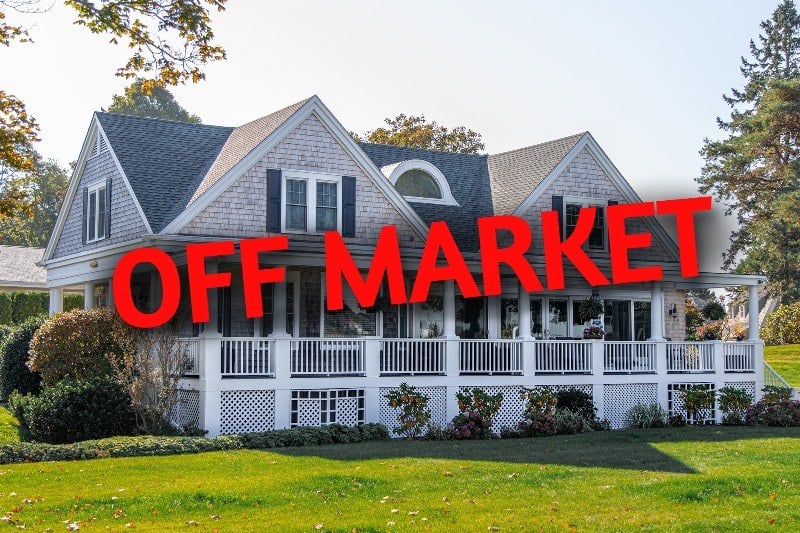In the realm of real estate transactions, a practice known as ‘selling a house off market’ or engaging in a ‘pocket listing’ has gained traction. This strategy diverges from the traditional route wherein properties are listed publicly for sale. Instead, these transactions occur privately, away from the public eye. The term ‘off market’ implies that the property is not advertised on multiple listing services (MLS), which are platforms typically used by real estate agents to share information about homes for sale. Despite its prevalence, this method is often shrouded in mystique due to its somewhat clandestine nature.
To demystify this process, it becomes crucial to dissect what selling a property off market truly entails and understand its implications for both sellers and buyers. Exploring why some homeowners choose this path over others reveals multi-faceted considerations involving privacy concerns, flexibility in negotiating terms, among others. Furthermore, an examination of preparation steps for selling a property off market can shed light on how these transactions differ from their counterparts. In understanding these nuances, potential sellers and buyers can make informed decisions regarding whether such an approach aligns with their respective needs and circumstances.
Understanding the Concept
Selling a house off market refers to the process where property transactions occur directly between the buyer and seller, often without traditional advertising or listing on public real estate databases. This approach is commonly known as an offmarket property sale. The concept revolves around bypassing common methods of marketing a home such as employing a real estate agent or listing it on multiple listing services (MLS), instead opting for less conventional means. Understanding this concept necessitates grasping that navigating the offmarket real estate market may require different strategies compared to traditional channels.
The benefits of selling a house off market can be numerous depending on individual circumstances. For instance, sellers might avoid some typical costs associated with preparing a home for viewings and listings, which could include professional photography or staging fees. Additionally, there’s potential for greater privacy since fewer people will have access to details about the home and transaction. However, alongside these advantages come certain drawbacks. One of the primary cons of off-market real estate transactions involves potentially limiting exposure to prospective buyers resulting in possibly lower offers.
While understanding the concept of selling houses off-market is crucial, recognizing why individuals choose this path is equally significant. Numerous reasons influence sellers’ decisions towards this direction ranging from privacy concerns to wanting a faster transaction process among others. Thus, comprehending these motivations provides insight into why some homeowners lean towards unlisted sales over other alternatives in today’s dynamic property landscape —a topic further explored in the following discussion about ‘reasons for selling’.
Reasons for Selling
There are various reasons why homeowners may choose to dispose of their properties without publicizing the transaction. Off-market real estate deals often provide a quieter, more private sales process than traditional methods. This strategy is particularly favored by sellers who wish to maintain privacy due to high public profiles or those with unique properties that may only appeal to a specific group of buyers. Additionally, selling off-market can also be beneficial for those who need to sell sell my house fast Fort Worth quickly and don’t have the time or resources required for staging, marketing, and showing their home.

Moreover, understanding how to sell your house without listing it on the open market involves leveraging exclusive property sales strategies. These include finding buyers for off-market properties through direct contact methods such as personal networks or specialized real estate agents. By bypassing general listing services, sellers can minimize competition while potentially maximizing profits in off-market home sales because they have more control over negotiations and ultimate sale price.
An important aspect of this approach also includes efficient preparation for sale which indirectly contributes towards enhancing the value of the property and making it attractive for potential buyers. The homeowner must ensure that all aspects of the property are well-maintained and in excellent condition prior moving forward with an off-market sale. Furthermore, professional assessments can help determine accurate pricing while legalities should be thoroughly checked before finalizing any deal. The subsequent section will delve into these preparatory aspects in detail ensuring a smooth transition from decision-making processes into practical implementation when opting for an unlisted property sale.
Preparation for Sale
Preparing a property for an unlisted sale involves meticulous attention to detail and a sell my house fast Texas series of strategic steps designed to enhance its appeal and value. It is often necessary to employ secrets to selling a house privately, as these strategies can help sellers navigate the complexities of private home sales effectively. The fasttrack home selling process relies heavily on first impressions, therefore making aesthetic improvements such as repairing any visible damages, decluttering, deep cleaning, landscaping, and staging the house professionally are all crucial steps. Not only does this make the property more attractive to potential buyers, but it also increases its perceived value.
An essential part of effective offmarket selling techniques is pricing the property correctly. This requires an in-depth understanding of local market trends, property values in the neighborhood and detailed knowledge about the features that add or subtract from residential property prices. A professional appraisal could be beneficial in obtaining an accurate valuation. In addition to setting a fair price point, sellers must also create compelling marketing materials that highlight key features and benefits of their properties – high-quality photos and engaging descriptions can significantly aid in capturing buyer’s interest.
Getting the best price in offmarket sales is not just about preparing the house for sale and pricing it right; it’s equally important to devise a plan for identifying potential buyers who may have interest in such properties. To achieve this goal efficiently, sellers should consider expanding their network by reaching out to real estate investors or agents who specialize in off-market transactions or utilizing digital platforms geared towards private real estate sales which offer access to multiple buyers at once without publicizing details widely. As we delve further into this topic, we will explore different ways of finding potential buyers which forms an integral part of successful off-market home sales.
Finding Potential Buyers
Identifying potential buyers for a private real estate transaction necessitates an astute understanding of the market and strategic networking efforts. Being privy to fast house sale strategies and quick home selling tips can equip sellers with the necessary knowledge to target the right buyer demographic. Furthermore, harnessing the power of technology and social platforms is crucial for maximum exposure in today’s digital age.

The following are some effective approaches that can aid in finding potential buyers:
- Fast House Sale Strategies:
- Pricing it Right – An accurate price that reflects the current market conditions increases chances of attracting interested parties.
- Enhancing Curb Appeal – First impressions matter; thus, improving the exterior look can draw more potential buyers.
- Quick Home Selling Tips:
- De-cluttering and Cleaning – A tidy, clutter-free property is more appealing to prospective buyers.
- Professional Photography – High-quality images showcase the property in its best light, making it more attractive.
Success stories abound from individuals who have implemented creative ways to sell a property fast off-market. These strategies for selling a house quickly often involve unique marketing techniques such as personalized videos or virtual tours, targeted online advertising campaigns, hosting open houses or exclusive viewings for select groups such as investors or first-time homeowners among others.
Before transitioning into negotiations and closing processes, one must remember that selling a house off-market requires patience and flexibility. It might take longer than traditional routes due to lack of exposure on real estate listings but offers control over who sees your property and how it’s presented. This approach may also yield better results because it allows room for negotiation without pressure from competing bids commonly seen in public sale scenarios which will be explored further in subsequent discussions about negotiating terms and concluding transactions effectively.
Negotiating and Closing
Navigating the subtleties of negotiation and finalizing a deal are pivotal stages in an off-market property sale, demanding both tact and astute decision-making. These nontraditional real estate sales necessitate a different approach than traditional home sales, which typically involve real estate agents and established market prices. When selling a home off-market, it is crucial to establish a fair price that reflects the current state of the local real estate market while also taking into consideration any unique attributes or potential improvements needed for the property.

The negotiation process in nontraditional real estate sales can be complex as buyers may not have access to comparable pricing data due to the private nature of these transactions. Therefore, sellers must carefully explain their pricing decisions, providing evidence where necessary such as recent appraisals or local market trends. This requires clear communication skills and transparency about the condition of the property. It is also important for sellers to remain flexible during negotiations, considering reasonable counteroffers from potential buyers.
After successfully negotiating terms that satisfy both parties, attention turns towards closing the transaction. Closing involves finalizing all necessary documentation including title transfers and payment arrangements—an essential step often managed by professionals in traditional real estate transactions but could fall onto seller’s responsibility in an off-market sale situation. This phase requires meticulous attention to detail to ensure legal compliance and avoidance of future disputes. As this stage concludes, it becomes evident how vital understanding legal considerations are within nontraditional real estate sales—providing insight into why they constitute an integral part of subsequent discussions on selling houses off-market.
Legal Considerations
Transitioning from the negotiation and closing stages of off-market property sales, it is vital to delve into the legal aspects that govern such transactions. These legal considerations play a crucial role in ensuring that both parties are protected and all steps in the sale process are adhered to as per regulations.
The first legal consideration pertains to compliance with local laws and regulations. This can include obtaining necessary permits, inspections, or certificates before the property transfer occurs. Additionally, while some jurisdictions may require certain disclosures about the property’s condition or history, others might call for specific paperwork documenting the transaction’s details. Therefore, it is essential for sellers to familiarize themselves with their local real estate laws before initiating an off-market property sale.
Moreover, contractual obligations are another aspect warranting attention during off-market sales. The agreement between buyer and seller must be legally binding and contain all relevant terms such as price, payment method, contingencies among other stipulations. It is recommended that sellers consult with a real estate attorney or professional who can guide them through this process while ensuring legality and fairness of contract terms. As we proceed further into this topic of off-market house selling transactions, let us now examine its advantages and disadvantages which will provide a more comprehensive perspective on this real estate practice.
Pros and Cons
Evaluating the benefits and drawbacks of off-market property sales offers a balanced view, aiding both buyers and sellers in making well-informed decisions. On the positive side, these types of transactions can offer more privacy for both parties involved. Since the sale is not publicly advertised, there’s less chance of neighbors or other interested parties knowing about it, which can be a significant advantage for those who value their privacy highly. Additionally, because there’s no need to stage the house for open inspections or take professional photos for listings, sellers might save on some costs.
- More privacy due to lack of public advertisement
- Potential cost savings as no staging or professional photography is required
- Lower stress levels as there are fewer people scrutinizing the property
- Enhanced control over who sees and purchases the home
- Possible faster transaction times since there are fewer parties involved
However, selling a home off-market also has its downsides. For one thing, it potentially limits exposure to potential buyers which could result in a lower selling price than what might have been achieved through an open market process. Additionally, without exposure to competitive bidding situations that occur during typical real estate transactions, sellers may not receive maximum value for their property. Furthermore, with a smaller pool of potential buyers also comes the risk that if deals fall through or get delayed because financing falls apart at last moment – something quite common in real estate transactions – it might take longer time than expected to finally sell the house.
The uncertainty regarding sale prices coupled with potential delays underscores several risks associated with off-market property sales. While they do have certain advantages such as enhanced privacy and possibly faster transaction times under ideal circumstances; these should be weighed against possible financial trade-offs and time delay risks before opting this route over traditional methods.
Frequently Asked Questions
What are some tax implications of selling a house off market?
Tax implications of off-market house sales may include capital gains tax on profit, potential for reduced deductions due to lack of competitive bidding, and possible exposure to gift tax if sold significantly below market value.
How does selling a house off market affect the value of neighboring properties?
Selling a house off market may influence neighboring property values indirectly. Effects depend on the sold price relative to expected market value, potentially establishing a new comparable sale for local real estate assessments.
Can I sell my house off market if it is currently under a lease or mortgage?
Yes, a house under lease or mortgage can be sold off market. However, existing financial obligations must be addressed appropriately through the sale proceeds or other means to avoid legal complications.
Are there specific insurance requirements or considerations when selling a house off market?
Insurance considerations for off-market house sales may vary. It is crucial to maintain existing homeowner’s insurance until the transaction completes. Consultation with an insurance expert is advised to navigate possible complexities in this process.
Can I sell a house off market if it’s part of an estate or inheritance?
Yes, it is permissible to sell a house off market even if it is part of an estate or inheritance. However, this process may involve additional legal complexities which should be navigated with professional assistance.
Other Articles You Might Enjoy
What Does Lead Paint Look Like

